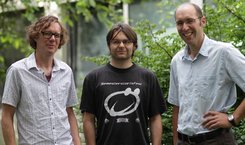21 Starting Grants for Max Planck scientists
European Research Council allocates funding grants to junior scientists for the fifth time
More Max Planck scientists than ever have reason to celebrate the fifth round of ERC Starting Grants: 4 female and 17 male researchers from 16 Max Planck Institutes have been awarded up to two million euros each to fund their projects. In total, the European Research Council awarded 536 Starting Grants to scientists from 21 countries.

It’s a real success story: Ever since the European Research Council (ERC) came into existence, the Max Planck Society (MPG) has encouraged its scientists to take part in the competition for EU funding, which is granted solely on the basis of excellence. The MPG has steadily improved its success rate from year to year,” said a delighted Max Planck President Peter Gruss. “This shows what a high calibre of scientists we have at our institutes, where they enjoy optimum conditions to address innovative research topics in an international, creative environment.”
The European Research Council (ERC) has been sponsoring future-oriented basic research in Europe since 2007 in order to support visionary projects and develop new interdisciplinary fields of knowledge. Once a year, following a strict selection procedure, the ERC awards what are known as Advanced and Starting Grants. While the Advanced Grants go to renowned top scientists, the Starting Grants are aimed at male and female scientists just setting out on their careers. The funding allows them to establish their own research teams and work autonomously on research projects of their own for a period of five years.
These coveted Starting Grants are in great demand. Some 4,741 applications were submitted to the ERC, of which on average 11.3 percent were approved. The Max Planck Society leads the field among German universities and research organizations with 32 percent. In fact, the MPG was beaten only by the French scientific organization Centre National de la Recherche Scientifique (CNRS), which received 26 Starting Grants. After 5 rounds of awards, the CNRS tops the winners’ list with a total of 109 Grants. The MPG is third with 57 Grants to date, while in second place is the University of Cambridge with 61 Grants. No other German institutions are among the top ten, which is dominated by no less than four English universities (Cambridge, Oxford, 2xLondon).
English institutions are in fact the most successful in the contest for Starting Grants, with 131 Grants going to scientists across the Channel. German universities and research organizations lag far behind with 78 Grants, ahead of French institutions with 73. On the other hand, that does not mean that British scientists have received the most funding; in the national rankings, German scientists (92) are ahead of them (68).
Of the 21 successful applications put forward by Max Planck scientists, the “Life Sciences” accounted for 10 Grants, “Physics and Engineering” for 9 Grants, and “Social and Human Sciences” for 2 Grants. This also roughly corresponds with the overall distribution of Grants, of which around 37 percent went to the Life Sciences, 44 percent to Physics and Engineering and only just under 19 percent to the Human Sciences. The proportion of female candidates among the funding recipients increased only slightly from 21 to 24 percent; among the MPG grantees, the proportion was 19 percent. The following scientists received a Starting Grant:
- Umut Acar (MPI for Software Systems)
- Sonja-Verena Albers (MPI for Terrestrial Microbiology)
- Wolfram Antonin, Michael Hothorn (Friedrich Miescher Laboratory)
- Jean-Christophe Baret, Björn Hof (MPI for Dynamics and Self-Organisation)
- Fulvia Bono (MPI for Developmental Biology)
- Xinliang Feng (MPI for Polymer Research)
- Ana J. Garcia-Saez (MPI for Intelligent Systems)
- Masaki Hori und Matthias Kling (MPI of Quantum Optics)
- Michael Kolbe (MPI for Infection Biology)
- Holger Kreckel (MPI for Nuclear Physics)
- Sebastian Leidel (MPI for Molecular Biomedicine)
- Esben Lorentzen, Andreas Pichlmair, Frank Schnorrer (MPI of Biochemistry)
- Magdalena Nowicka (MPI for the Study of Religious and Ethnic Diversity)
- Michael Potente (MPI for Heart and Lung Research)
- Stephan Schill (MPI for Comparative Public Law and International Law)
- Fabian Walter (MPI for Astronomy).
SB












